KPK Annual Report 2017 |
|
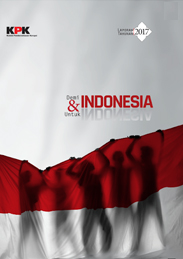 |
We never stop uttering the word “fighting”. Everything that happened in 2017 brought us to more realization that we have to keep going; that all these hard works must be continued for the sake of our beloved country. Indonesia is populated by more than 250 million people. The vast archipelago consists of 34 provinces, 415 regencies, and 93 cities – which mean the same numbers of governor, regent and mayors. KPK strives to create much cleaner, corruption-free Indoneia. Every sector is improved through breakthroughs and facilities to support corruption eradication efforts. This year, we face a number of challenges that we have to overcome with all our might. |
KPK Annual Report 2016 |
|
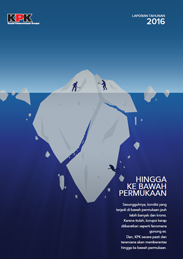 |
In 2016 in the field of prevention, the Commission made many new breakthroughs. Coordination and Supervision of Prevention (Korsupgah) in 2016 is done by integrating with the field of action. Through Integrated Korsupgah, KPK can dig more data and facts in the target area of the program. As a result, KPK can find out the source of problems in various target areas of the program, so that the mentoring is also in line. Like treating illness, if the diagnosis is right, then exactly the therapy provided. Similarly, for other programs, such as the eradication of corruption in the health, energy, private, political, and related to education, socialization and campaign sectors, all are done by first exploring the root of the problem. Related to efforts to improve the compliance level of the State Licensing Assets Report (LHKPN), for example. In this case, the Commission continues to explore the problems that cause the state organizers "reluctantly" to report wealth assets. From here the Commission found the fact, that for the organizers of countries located in remote areas, would be difficult if it had to come to the KPK. In addition to time constraints, there are also cost consequences that can be a burden. From here the Commission then launched e-LHKPN. Through such information technology-based applications, state officials do not need to come to the capital. Just click, fill in, and then send through the same application. Download KPK Annual Report 2016 in Bahasa Indonesia |
KPK Annual Report 2015 |
|
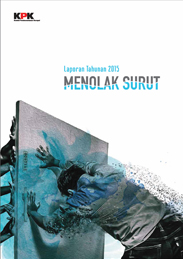 |
The year 2015 is a tough episode for the KPK as an institution that has been 12 years old. Various tests hit, may be a separate learning so that later, the institution is increasingly trusted public. What causes a person to drown? The answer, because he does not move. Or if it moves anyway, the motion is not uniform so that nothing useful for the owner. Maintaining consistency and rhythm of motion, which we then refer to as "swimming" that, then able to save someone from a condition called "drown". Yes, staying in such conditions is important. Just as we did throughout 2015, though tests and trials hit. In that situation, the KPK strives to implement various work programs and activities that have been established as part of the commitment to run the mandate in the fight against corruption. In the field of prosecution, for example, a number of breakthroughs continue to be done in efforts to eradicate corruption. Amid the limitations of the number of investigators, the KPK strives to work |
KPK Annual Report 2014 |
|
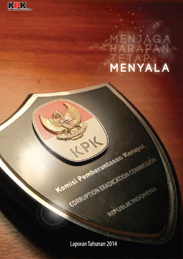 |
Named as a political year, in 2014 political frenetic has begun to be felt. Along with that, the KPK took part in welcoming and escorting the important agenda of that year, namely elections. Therefore, the succession of national leadership becomes the gateway for the sustainability of corruption eradication. The KPK sees with optimism that leaders with integrity are dreams that can be realized. The 2014 Integrated Election Program is a milestone for getting the leader, who can bring this nation better over time. One that the KPK is doing, for example, encourages the commitment of presidential candidates through the signing of a white book containing eight corruption eradication agendas recommended by the KPK. KPK hopes the hands of the candidates in one of the pages of the book, is a representation of anticorruption commitments that will be realized when elected. On the other hand, that momentum also witnessed by the public who will oversee the leader's performance. A number of other strategic steps are also conducted by the KPK in escorting the election, among them by echoing the "Choose the Honest" tagline. Spreading the understanding of how important it is to just pick a figure that is believed to be honest and clean to oversee the country. Only for the sake of creating a government that is not only pro, also active and earnest in the fight against corruption. Elections and political agenda in 2014, does not necessarily make the Commission just focus to it. A series of programs and other corruption eradication efforts continue. Rescue the wealth of the country, continue digeber. These wealthy nations must not be conquered by the penggarong, either openly or subtly, trying to exploit the holes in the management system. |
KPK Annual Report 2013 |
|
|
There are a number of strategic steps taken by the KPK in the period of 2013 as part of the offerings to the country, including: The KPK is also in the process of transforming corruption eradication through two strategic programs. Later prevention is not just a program in the sector of ministries and state institutions. The facts show that the family is often the main base that produces the perpetrators of corruption. Therefore, the Commission initiated a program to Build a Family-Based Anti-Corruption Culture. Another strategic thing, the KPK is entering a new era of more aggressive and massive corruption campaign with the construction of "Channel Channel" a radio stream. Through KanalKPK, the institute will be able to reach a wider, more direct, real time community over anti-corruption programs. In the context of consolidation of human resources also undertake various strategic programs. The idea to build the KPK human resource architecture has already begun. Completion of ethical codes, the formulation and implementation of integrity surveys, and the handling of ethical violations are of great concern. Last but not least, KPK has started "ground breaking" for the construction of new building of KPK. It is hoped that the building will not only be representative for all KPK staff, but the KPK building will be a "Graha Kebangsaan" and "Tent of Concern" where an oasis will be established which will move the potential of all competence and honor to realize a New Indonesia Clean and Free from Corruption. |
|
KPK Annual Report 2012 |
|
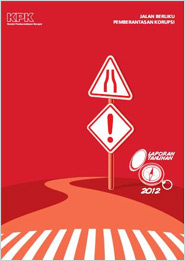 |
The 2012 Financial Report encompasses all financial aspects managed by the Corruption Eradication Commission (KPK). The Report was drafted with the Institution Accounting System (SAI), a series of manual and computerized procedures, from data collection, recording and cataloguing, to financial position and financial operation reports of state ministry/institution. KPK is a sole work unit and there is none of other units under KPK. SAI comprises Financial Accounting System (SAK) and State Assets Management Information and Accounting System (SIMAK-BMN). SAK is designed to produce State Institution/Ministry Financial Report (LKKL) that consists of Budget Realization Report, Balance, and Record on Financial Report. SIMAK-BMN, meanwhile, is a system to come up with information on fixed assets, stock and other information required to arrange balance and report on state assets or other managerial reports. KPK’s Audited Financial Report consists of Budget Realization Report, Balance, and Record on Financial Report of Fiscal Year 2012. The Financial Report was created based on sufficient internal monitoring system, and the contents provide information on budget implementation and financial position according to Government Accounting Standard. |
KPK Annual Report 2011 |
|
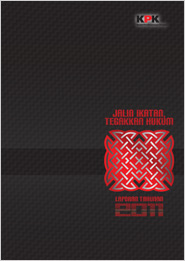 |
KPK Financial Report 2011 encompasses all financial aspects managed by reporting entities, including the structural hierarchy like employees of Echelon I and II that are responsible for budget credit authorization. KPK is a sole work unit and no other work units report to KPK. The Report was drafted with the Institution Accounting System (SAI), which comprises Financial Accounting System (SAK) and State Assets Management Information and Accounting System (SIMAK-BMN). SAI is designed to produce State Institution/Ministry Financial Report (LKKL) that consists of Budget Realization Report, Balance, and Record on Financial Report. The Supreme Audit Agency (BPK) stated that KPK’s Balance dated 31 December 2011 and 2010, and Budget Realization Reports ended on those dates, are proper, and every material aspect and KPK’s financial positions on 31 December 2010 and 2011, as well as budget realizations for the fiscal years ended on those dates, are in line with the Government Accounting Standard. |
KPK Annual Report 2010 |
|
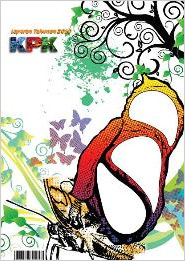 |
The drafting of the financial report of the Corruption Eradication Commission (KPK) referred to Financial Ministerial Decree No. 171/PMK.05/2007 on Central Government’s Accounting System and Financial Report, and Director General of Treasury Regulation No. PER-65/PB/2010 on Guideline on Financial Report Drafting of State Institution/Ministry. The information presented in the report is arranged according to existing regulations. There are several notes in regards to Financial Report 2010: The Balance Sheet gives information on the positions of assets, liabilities and equities of KPK in the fiscal year of 2010. The assets value reached Rp 774,750,005,953.00 while the liabilities at Rp3.891.752.442,00, and fund equity (net wealth) of KPK as of 31 December 2010 was Rp 770,858,253,511.00. The 2010 Financial Report has been audited by the Supreme Audit Agency (BPK). |
KPK Annual Report 2009 |
|
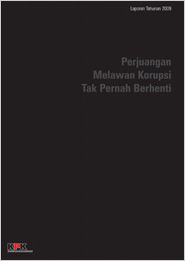 |
KPK Financial Report 2009 encompasses all financial aspects managed by reporting entities, including the structural hierarchy like employees of Echelon I and II that are responsible for budget credit authorization. KPK is a sole work unit and no other work units report to KPK. |
KPK Annual Report 2008 |
|
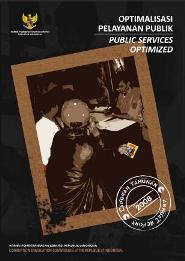 |
KPK Financial Report 2009 encompasses all financial aspects managed by reporting entities, including the structural hierarchy like employees of Echelon I and II that are responsible for budget credit authorization. KPK is a sole work unit and no other work units report to KPK. The Report was drafted with the Institution Accounting System (SAI), which comprises Financial Accounting System (SAK) and State Assets Management Information and Accounting System (SIMAK-BMN). SAI is designed to produce State Institution/Ministry Financial Report (LKKL) that consists of Budget Realization Report, Balance, and Record on Financial Report. The Supreme Audit Agency (BPK) stated that KPK’s Balance dated 31 December 2008 and 2007, and Budget Realization Reports ended on those dates, are proper, and every material aspect and KPK’s financial positions on 31 December 2010 and 2011, as well as budget realizations for the fiscal years ended on those dates, are in line with the Government Accounting Standard. |
KPK Annual Report 2007 |
|
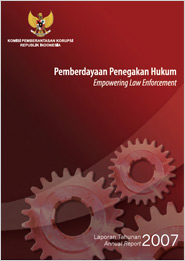 |
To free Indonesia from corruption, the vision proclaimed by the KPK. However, to achieve that vision is not an easy task. It is impossible that the KPK is capable of eliminating a chronic disease called corruption from this homeland alone. The active role of the community is supported by the seriousness of the ranks of the government at the central and regional levels as well as the improvement and empowerment of agencies and law enforcement officers is an absolute requirement to realize those expectations. Therefore, in addition to making efforts to prevent and prevent corruption, Law no. 30 Year 2002 also saved the KPK to empower agencies and law enforcement officers. The task is contained in article 6 of which through supervision activities, monitors, and coordination. In this fourth year, the KPK is increasingly actively doing the empowerment effort. Coordination and supervision on the handling of cases of corruption with the prosecutor's office and the police are increasingly enhanced. Similarly, the Commission's efforts in improving the bureaucratic system in the existing agencies in this country. Recommendations for improvement of the system in customs, immigration, and management of Indonesian Migrant Workers (TKI) are some examples. On the other hand, prevention and action efforts are also continuously conducted by KPK simultaneously with balanced speed. As the corruptors continue to be rounded up, at the same time the efforts of mental formation of anti-corruption and the building of the spirit of resistance against corruption among the public are intensified. KPK leaders realize that efforts to empower the bureaucracy and law enforcement agencies will not reap tangible results if there is no willingness and support from the bureaucracy and law enforcement itself. Finally, we again remind all parties that the fight against corruption is a process of long-term change that requires courage, togetherness, great steps and soul, and sincerity almost without limit. |
KPK Annual Report 2006 |
|
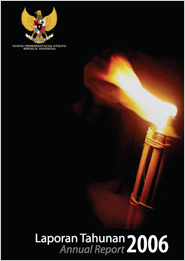 |
Creating a prosperous Indonesia is the lofty ideals of the founders of this nation. These conditions can only be achieved if the country is free from the bondage of corruption. The hope of all people who want to live in a country free from corruption is partially suspended among others on the Corruption Eradication Commission (KPK). In this third year, the Commission seeks to meet the expectations of the community by doing a number of work programs not only crack down on corruptors legally, but also do prevention. Prevention programs such as raising a number of cooperation with other educational institutions and institutions have been conducted, including efforts to encourage the government to implement bureaucratic reform. KPK leaders realize that prevention efforts will not reap real results if legal action is not aggressively carried out. Action is an important effort in law enforcement as a shock therapy that is expected to provide a deterrent effect for the perpetrators of corruption. Prevention and action steps must be done simultaneously and integrated with the same speed. Freeing Indonesia from chronic disease of corruption is a big job that we can not do alone. The role of the community is actively supported by the seriousness of the ranks of state and law enforcement officials both at central and regional levels, is an absolute requirement to realize those expectations. KPK realizes that eradication of corruption is a major war that must be done sustainably, and the time required is not in a matter of months or years but in the size of the generation. Thus, the great fight against corruption is a process of long-term change that requires courage, togetherness, great steps and spirit, and virtually limitless sincerity. |
KPK Annual Report 2005 |
|
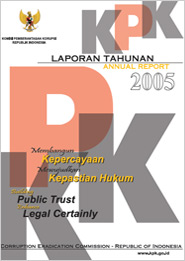 |
Indonesia is corruption free. This hope has indeed become the dream of many children of the nation. Since its establishment December 29, 2003, many people's hopes depend on the Corruption Eradication Commission (KPK). One proof is the spike in the number of public complaints about alleged criminal acts of corruption. A total of 2,243 reports were received by KPK throughout 2004 and more than 7,300 reports were received in 2005. This surge in public complaints has left us, the KPK Leader, stunned. How high the public expectation of KPK's ability to crack down and eradicate corruption. Although the KPK's capability is still very limited, it is still very limited compared to the reality of the condition and the corruption problem in Indonesia today, in order to realize the people's expectation |
KPK Annual Report 2004 |
|
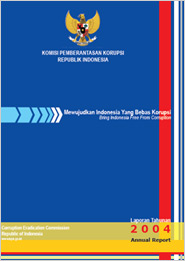 |
December 29, 2003 is the starting point for the Corruption Eradication Commission (KPK) in performing its duties, marked by the pronouncement of the oath of office of the KPK leadership in front of the President of the Republic of Indonesia as the Head of State. KPK leaders realize how much people hope for the success of the Corruption Eradication Commission in carrying out the heavy task of eradicating corruption. In its first year the KPK's leadership strives to fulfill part of our longing for early success in efforts to eradicate corruption. This report is submitted to fulfill the obligation of accountability to the public as regulated in Article 20 of Law Number 30 Year 2002, by explaining the activities that have been conducted during the Year 2004, and what will be done in the future. |